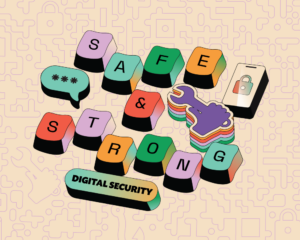Tibet Action Institute launches Cyber Superhero campaign
Cyber Stewards Network partner Tibet Action Institute (TAI) has launched a new program aimed at getting ordinary users of mobile and online technology in Tibet to adopt safe habits to prevent malware and viral attacks. The Cyber Superhero website contains information that is particularly relevant for Tibetans living in exile, whose online and mobile communications with friends and family in Tibet are often the subject of security intrusions and malware attacks by Chinese government officials. A video summarizing the Cyber Super Hero campaign’s initiatives can be viewed here.
The website launched by TAI features simple tips such as updating computer software, using strong, unique passwords, and HTTPS and 2-step verification for online services. It warns against using chat software WeChat, known to store communications records that are then accessed by the Chinese government. Other mobile security tips include using prepaid SIM cards in order to avoid identification of the user, as well as removing the battery of the phone when not in use.
China has allegedly hacked several activist websites, as well as that of the Dalai Lama and others expressing nationalist opinions, all in an effort to obtain the information of readers accessing the sites. The information that is obtained is often used to make arrests for sharing communications considered subversive to the Chinese government. The Citizen Lab’s Information Warfare Monitor project’s report, titled “Shadows in the Cloud: Investigating Cyber Espionage 2.0,” documented a complex ecosystem of cyber espionage that systematically targeted and compromised computer systems in India, the Offices of the Dalai Lama, the United Nations, and several other countries.
In addition, the Citizen Lab published reports titled “Permission to Spy: An Analysis of Android Malware Targeting Tibetans” and “Surtr: Malware Family Targeting the Tibetan Community,” which is part of a series documenting the use of information operations against Tibetans and others who advocate for Tibetan rights and freedoms. An analysis of mobile messaging applications privacy standards was also conducted by the Citizen Lab in a report titled “Asia Chats: Analyzing Information Controls and Privacy in Asian Messaging Applications.”

